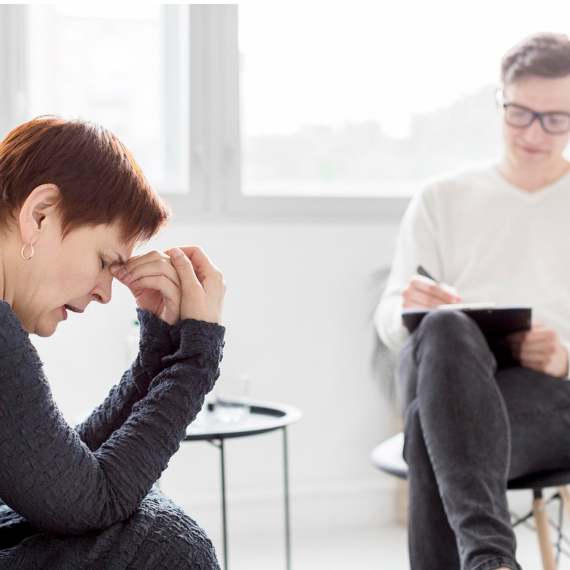- 3rd block,18th Main Rd, Bengaluru, Karnataka 560010.
Everyone worries or feels nervous from time to time. Anxiety is a normal human reaction to stressful situations. But for people with anxiety disorders, those fears and worries aren’t temporary. Their anxiety persists and can even get worse over time. Anxiety disorders can severely impair a person’s ability to function at work, school, and in social situations. Anxiety can also interfere with a person’s relationships with family members and friends. Fortunately, though, there are effective treatments for anxiety. In some cases, medications have a role in treating anxiety disorders. Yet research shows behavioral treatment, alone or in combination with medication, is a highly effective treatment for most people with an anxiety disorder.
Generalized anxiety disorder is characterized by persistent worry or anxious feelings. People with this disorder worry about a number of concerns, such as health problems or finances, and may have a general sense that something bad is going to happen. Symptoms include restlessness, irritability, muscle tension, difficulty concentrating, sleep problems, and generally feeling on edge. Panic disorder is marked by recurrent panic attacks that include symptoms such as sweating, trembling, shortness of breath, or a feeling of choking; a pounding heart or rapid heart rate; and feelings of dread. Such attacks often happen suddenly, without warning. People who experience panic attacks often become fearful about when the next it will occur, restrict their normal activities.

Social anxiety disorder is also known as social phobia. People with this disorder are fearful of social situations in which they might feel embarrassed or judged. They typically feel nervous spending time in social settings, feel self conscious in front of others, and worry about being rejected by or offending others. Other common symptoms include having a hard time making friends, avoiding social situations, worrying for days before a social event, and feeling shaky, sweaty, or nauseous when spending time in a social setting. Obsessive compulsive disorder is characterized by persistent, uncontrollable feelings and thoughts (obsessions) and routines or rituals. Some common examples include compulsive hand washing in response to a fear of germs, or repeatedly checking work for errors.
Though many types of anxiety disorders exist, research suggests that most are driven by similar underlying processes. People with anxiety disorders tend to become easily overwhelmed by their emotions, and they tend to have particularly negative reactions to those unpleasant feelings and situations. Often, people try to cope with those negative reactions by avoiding situations or experiences that make them anxious. Unfortunately, avoidance can backfire and actually feed the anxiety. Psychologists are trained in diagnosing anxiety disorders and teaching patients healthier, more effective ways to cope. A form of psychotherapy known as cognitive behavioral therapy is highly effective at treating anxiety disorders. Through CBT, psychologists help patients learn to identify and manage the factors that contribute to their anxiety. By learning to change those thought patterns, they can reduce the likelihood and intensity of anxiety symptoms.

The two main treatments for anxiety disorders are psychotherapy and medications. You may benefit most from a combination of the two Also known as talk therapy or psychological counseling, psychotherapy involves working with a therapist to reduce your anxiety symptoms. It can be an effective treatment for anxiety. Cognitive behavioral therapy is the most effective form of psychotherapy for anxiety disorders. Generally a short term treatment, CBT focuses on teaching you specific skills to improve your symptoms and gradually return to the activities you've avoided because of anxiety. includes exposure therapy, in which you gradually encounter the object or situation that triggers your anxiety so you build confidence that you can manage the situation and anxiety symptoms. Several types of medications are used to help relieve symptoms, depending on the type of anxiety disorder you have and whether you also have other mental or physical health issues. In limited circumstances, your doctor may prescribe other types of medications, such as sedatives, also called benzodiazepines, or beta blockers. These medications are for short term relief of anxiety symptoms and are not intended to be used long term.


